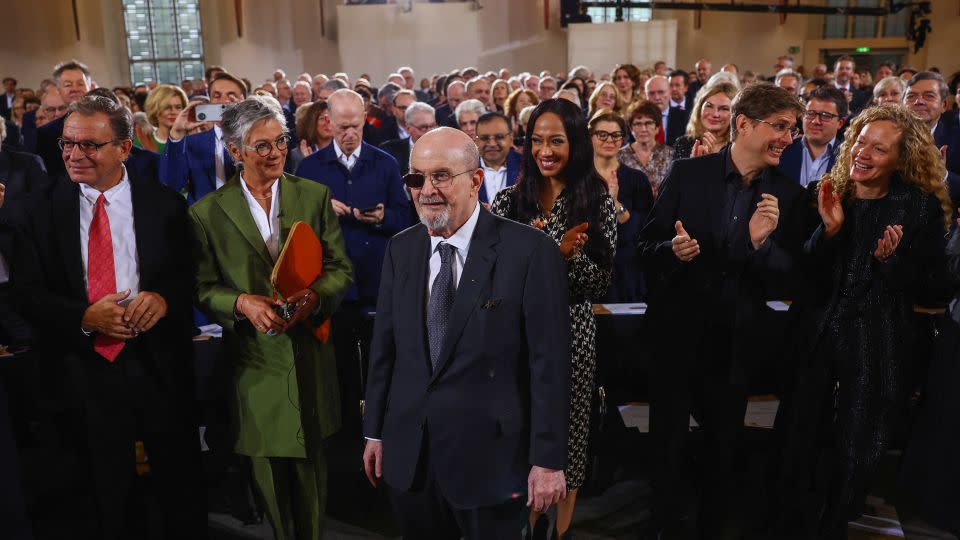Salman Rushdie says he had a ‘premonition’ of being attacked just days before the stabbing that left him blind in one eye
- Oops!Something went wrong.Please try again later.
- Oops!Something went wrong.Please try again later.
Renowned author Salman Rushdie has revealed more details about the knife attack that left him blind in one eye, telling CBS’ “60 Minutes” on Sunday that he had a “premonition” of the event just days beforehand.
Giving his first television interview since he was stabbed several times on stage shortly before he was due to deliver a lecture at the Chautauqua Institution in New York in August 2022, the Indian-born novelist told Anderson Cooper he had “dreams of being attacked in an amphitheater” before going there.
“I said to my wife, Eliza, ‘I don’t want to go’ because of the dream. And then I thought, ‘Don’t be silly, it’s a dream,’” he recalled.
In another interview, published Monday, Rushdie told the BBC that his eye hung out of its socket “like a soft-boiled egg” after the attack and that losing his sight in it “upsets me every day.”
The 76-year-old, widely regarded as one of his generation’s most important authors, has received death threats ever since his 1988 novel “The Satanic Verses.”
The book draws on a deeply controversial story in early Islamic tradition that claims Satan momentarily intruded in the divine revelations to the Prophet Mohammed, angering some Muslims and prompting Iran’s supreme leader, Ayatollah Ruhollah Khomeini, to issue a religious decree, or fatwa, calling for his death.
Violence followed the book’s publication—its Japanese translator was murdered, while at least 18 people were killed in demonstrations in Mumbai and Islamabad, according to Reuters.

“I had no idea (it would cause violence),” Rushdie told “60 Minutes,” adding: “I thought maybe some conservative religious people wouldn’t like it but they don’t like anything I wrote anyway so I thought they don’t have to read it.”
“(It was) probably (naïve),” he added, recalling that there were about half a dozen serious attempts on his life. “It’s easy looking back but nothing like this had ever happened to anybody and of course almost all the people who attacked the book did so without reading it.”
Rushdie has now written about the 2022 attack and his recovery from it in a memoir which, he said, he at first resisted writing, before realizing that he “couldn’t write anything else.” The memoir, titled “Knife: Meditations After an Attempted Murder,” will be published Tuesday.
Hadi Matar, the man accused of stabbing Rushdie and another person on stage, pleaded not guilty to charges of second-degree attempted murder and second-degree assault.
Matar’s trial was initially scheduled for January 8 but the court granted a request for its delay earlier that month, his attorney Nathaniel Barone told CNN at the time.
Barone said Rushdie’s upcoming memoir was not the reason for the delay in the trial, but he went on to say that “pursuant to the New York State Criminal Procedure Law the Defense is entitled to any and all information associated with the drafting and publication of the book.”
On Sunday, Rushdie told “60 Minutes” that as he saw the attacker running toward the stage just before the attack, “it felt like something coming out of the distant past and trying to drag me back in time, if you like, back into that distant past, in order to kill me.”
The Booker Prize-winning author was stabbed 15 times in 27 seconds by his attacker, who only stopped when audience members pulled him away, he said.
“I was watching (blood) spread and then thinking I was probably dying,” Rushdie added. “It was quite matter of fact. It wasn’t like I was terrified or anything, no heavenly choirs, no pearly gates … I believe that death comes as the end, there was nothing that happened that made me change my mind about that.”
Since surviving the attack, he said he isn’t “very different” but that it “has left a shadow.”
“Some days it’s dark and some days it’s not. I feel more the presence of death.”
CNN’s Michelle Watson, Tamara Qiblawi and Zeena Saifi contributed reporting.
For more CNN news and newsletters create an account at CNN.com
